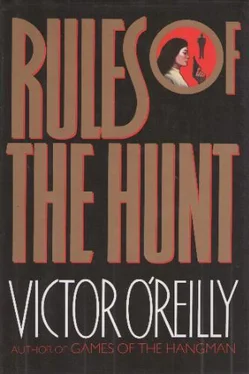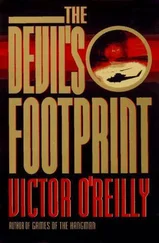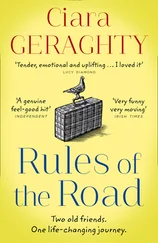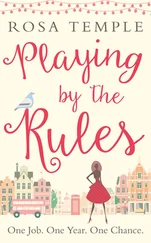Victor O'Reilly - Rules of The Hunt
Здесь есть возможность читать онлайн «Victor O'Reilly - Rules of The Hunt» весь текст электронной книги совершенно бесплатно (целиком полную версию без сокращений). В некоторых случаях можно слушать аудио, скачать через торрент в формате fb2 и присутствует краткое содержание. Жанр: Триллер, на английском языке. Описание произведения, (предисловие) а так же отзывы посетителей доступны на портале библиотеки ЛибКат.
- Название:Rules of The Hunt
- Автор:
- Жанр:
- Год:неизвестен
- ISBN:нет данных
- Рейтинг книги:4 / 5. Голосов: 1
-
Избранное:Добавить в избранное
- Отзывы:
-
Ваша оценка:
- 80
- 1
- 2
- 3
- 4
- 5
Rules of The Hunt: краткое содержание, описание и аннотация
Предлагаем к чтению аннотацию, описание, краткое содержание или предисловие (зависит от того, что написал сам автор книги «Rules of The Hunt»). Если вы не нашли необходимую информацию о книге — напишите в комментариях, мы постараемся отыскать её.
Rules of The Hunt — читать онлайн бесплатно полную книгу (весь текст) целиком
Ниже представлен текст книги, разбитый по страницам. Система сохранения места последней прочитанной страницы, позволяет с удобством читать онлайн бесплатно книгу «Rules of The Hunt», без необходимости каждый раз заново искать на чём Вы остановились. Поставьте закладку, и сможете в любой момент перейти на страницу, на которой закончили чтение.
Интервал:
Закладка:
A car, a white Vauxhall Cavalier, had come up behind her when she had stopped for the cattle. She noticed idly that there were two – no, three – men in it and it did not look local. It drove behind her for the next two miles until she came to her parents' isolated bungalow, and as she turned into the tree-shaded drive it followed her.
She parked and got out. She could smell wood smoke. Inside, her mother would be preparing breakfast. She felt tired, but it was very pleasant to chat with her parents over a cup of tea before heading off to get some sleep.
She walked toward the Cavalier. The roads were not well sign-posted, so this was probably people lost again. The network of minor roads was quite confusing.
As she approached the car, the two front doors opened and two men got out. The driver had crinkly reddish hair and pleasant open features. He was smiling. He put a hand inside his coat. When it reappeared, it was holding an automatic pistol.
Kathleen looked at the gun in shock and a terrible, all-encompassing fear gripped her. She was about to scream when the smiling man kicked her very hard in the stomach. Roughly, he pulled her up and hit her again hard in the face. "Let's go inside, Kathleen," he said. "We'd like a wee word with your parents."
Kilmara did not take kindly to using such scarce and expensive resources as his elite Rangers on something as mundane as static guard duty.
He liked to take the initiative. Guard duty, he believed, wasted the expertise of his men. A Ranger on guard duty was just one more target with scant opportunity to utilize his unique skills. Waiting for something to happen left the terrorist with the freedom to strike when and where he wished, and to have local firepower superiority even when outgunned on a national basis.
He had to look no further than Northern Ireland across the border to have this truth demonstrated. There, a few hundred IRA activists kept thirty thousand British troops and armed police fully stretched – and still the killing went on.
In the case of providing security for Fitzduane, Kilmara was prepared to make an exception. The official justification was the Fitzduane held a reserve commission in the Rangers – he had the rank of colonel – and therefore they were merely looking after one of their own. Actually, it had more to do with friendship and a long history together. Kilmara did not like to see his friends getting shot. Over a long and turbulent military career, it had happened more than a few times, and now he valued those close to him who were left.
Six Rangers had been assigned to guard Fitzduane. Allowing for shifts, this meant that two were on duty and two on standby at any one time, and the remaining two were off station. Perimeter security consisted of an armed plainclothes detective in the grounds below Fitzduane's window, and another detective in the hospital reception area monitoring the front stairs and elevator.
Primary internal security consisted of a control zone on the private ward where Fitzduane was located. Two sets of specially installed doors sealed off the corridor. The rule was that only one set of doors could be opened at once. Visitors were checked through one door, which was closed behind them, then checked in again in the control zone before being allowed through the second set of doors. There was a metal detector in the control zone. All staff who had right of access had been issued special passes and a daily code word. Their photographs were pinned up by the internal guard, but by this time all the regulars were known by sight.
There were six private rooms off the central corridor once you got through the two sets of doors. Initially, four of these had been occupied, but after an epic battle with the hospital authorities, Kilmara had managed to get them cleared after the first week. Now one room was occupied by Fitzduane, a second one was used for sleeping by off-duty Rangers, and a third functioned as a makeshift canteen. The other three were empty.
It seemed a reasonably secure arrangement and the police were quite happy, but the whole setup made Kilmara nervous. It might be good enough to keep a conventional killer at bay, but a terrorist threat was of a different order of magnitude. Terrorists had access to military grade weapons. They used grenades, explosives, and rocket launchers. They had been known to use helicopters and microlights and other esoteric gadgetry. They were often trained in assault tactics.
In the face of a sudden commando raid and terrorist firepower, the defenders – security zone or no – would not have an easy time. Just one rocket fired through Fitzduane's window would not do him much good either. Sure, they had bolted in place some bulletproof glass, but an RPG projectile would cut through that like butter. The things had been designed to take on tanks. Unfortunately, there were a number of such weapons on the loose in Ireland. Quadafi had supplied several shiploads of rifles, explosives, heavy machine guns, and rocket launchers to the IRA. He had even thrown in some handheld anti-aircraft missiles. There were arms caches all over the country. Many had been found. Many others had not.
Kilmara tried to console himself with the thought that most of the time nothing ever happens. Many threats are made; very few are implemented. Most potential targets die in their beds of old age and good living. Such thoughts seemed logical until he applied them to Fitzduane. Then his instincts screamed. The man was a magnet for trouble.
In the second week of Fitzduane's stay in the hospital, when the basic precautions had been in place and the man himself out of intensive care, Kilmara had sent the problem to Ranger headquarters in Dublin. There the scenario had been evaluated by two teams. One team had worked out how to defeat the security and kill Fitzduane. The second had looked at current and past terrorist methodology and current and past counterterrorist protection techniques.
The findings had been pooled and the exercise repeated several times. The final conclusions had led Kilmara to implement several more security measures. Above all, he wished he could move Fitzduane, but that would have to wait a few weeks longer. He was recovering, but needed – absolutely had to have – the specialized care of the hospital. Set against that certainty, the possibility of another assassination attempt was a minor risk. Or so said the computer.
Kilmara looked at the screen when the finding came up. He remembered a game he used to play with his girlfriends as a teenager. You'd pluck the petals from a daisy one by one. “She loves me; she loves me not; she loves me; she loves me not.” The last petal would decide the issue.
"I don't trust computers any more than I trusted daisies," he said to the screen. The cursor winked back at him. "Nothing personal," he added.
The first finding of the Ranger attack-scenario exercise had been that the maximum point of vulnerability at the hospital was not the security deployment as such, but the people.
"Between you and me, and these four walls," said Kilmara to the screen, "I really didn't need a computer to tell me that." He rubbed the gray hairs in his beard. "Life has a habit of instilling that lesson."
The computer continued to wink at him. He quite liked the beasts and they were damn useful, but sometimes they got on his nerves.
He pressed the off switch and, with some satisfaction, watched the monitor die a little death.
They had opened the door with Kathleen's key and then pushed her down the hall in front of them.
Her parents were in the large kitchen at the back, her mother at the Aga stove stirring porridge, her father sitting at the table reading yesterday's Irish Times. ‘The Pat Kenny Show’ was on the radio in the background.
Читать дальшеИнтервал:
Закладка:
Похожие книги на «Rules of The Hunt»
Представляем Вашему вниманию похожие книги на «Rules of The Hunt» списком для выбора. Мы отобрали схожую по названию и смыслу литературу в надежде предоставить читателям больше вариантов отыскать новые, интересные, ещё непрочитанные произведения.
Обсуждение, отзывы о книге «Rules of The Hunt» и просто собственные мнения читателей. Оставьте ваши комментарии, напишите, что Вы думаете о произведении, его смысле или главных героях. Укажите что конкретно понравилось, а что нет, и почему Вы так считаете.




![Беар Гриллс - The Hunt [=The Devil's Sanctuary]](/books/428447/bear-grills-the-hunt-the-devil-s-sanctuary-thumb.webp)







